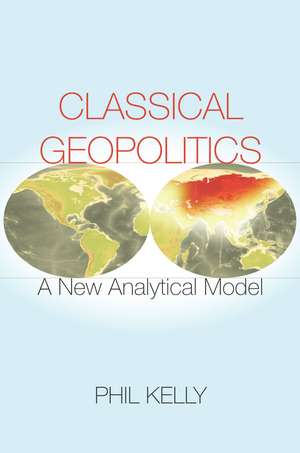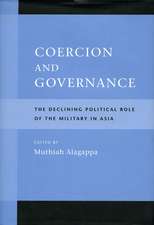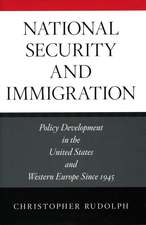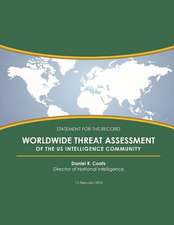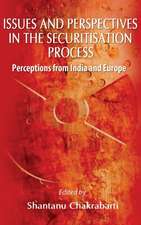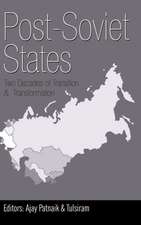Classical Geopolitics: A New Analytical Model
Autor Phil Kellyen Limba Engleză Paperback – 9 feb 2016
Geopolitics is the study of how the projection of power (ideological, cultural, economic, or military) is effected and affected by the geographic and political landscape in which it operates. Despite the real world relevance of geopolitics, a common understanding of what classical geopolitics is and how it works still lies beyond the reach of both researchers and practitioners.
In Classical Geopolitics, Phil Kelly attempts to build a common theoretical model, incorporating a host of variables that reflect the complexity of the modern geopolitical stage. He then analyzes thirteen pivotal but widely differing historical events stretching from the Peloponnesian War to World War II, from the fall of the British and Soviet empires to the contemporary diplomacy of South America. Through this analysis, Kelly tests the efficacy of his model as a comprehensive geopolitical analytical tool that can be used across a broad spectrum of geopolitical contexts and events.
In Classical Geopolitics, Phil Kelly attempts to build a common theoretical model, incorporating a host of variables that reflect the complexity of the modern geopolitical stage. He then analyzes thirteen pivotal but widely differing historical events stretching from the Peloponnesian War to World War II, from the fall of the British and Soviet empires to the contemporary diplomacy of South America. Through this analysis, Kelly tests the efficacy of his model as a comprehensive geopolitical analytical tool that can be used across a broad spectrum of geopolitical contexts and events.
| Toate formatele și edițiile | Preț | Express |
|---|---|---|
| Paperback (1) | 203.20 lei 3-5 săpt. | |
| Stanford University Press – 9 feb 2016 | 203.20 lei 3-5 săpt. | |
| Hardback (1) | 719.82 lei 6-8 săpt. | |
| Stanford University Press – 9 feb 2016 | 719.82 lei 6-8 săpt. |
Preț: 203.20 lei
Nou
Puncte Express: 305
Preț estimativ în valută:
38.88€ • 40.68$ • 32.30£
38.88€ • 40.68$ • 32.30£
Carte disponibilă
Livrare economică 13-27 martie
Preluare comenzi: 021 569.72.76
Specificații
ISBN-13: 9780804798204
ISBN-10: 0804798206
Pagini: 224
Dimensiuni: 152 x 229 x 15 mm
Greutate: 0.3 kg
Editura: Stanford University Press
Colecția Stanford University Press
ISBN-10: 0804798206
Pagini: 224
Dimensiuni: 152 x 229 x 15 mm
Greutate: 0.3 kg
Editura: Stanford University Press
Colecția Stanford University Press
Recenzii
"This is an important work. Many teachers of IR tend to dismiss geopolitics as having been overtaken by technology, but Phil Kelly's analysis shows how mistaken they are. He makes a strong case for the applicability of geopolitical analysis to the study of IR, foreign policy, and strategic analysis. A very worthy contribution to the study of IR and security affairs in general."—Mackubin Owens, Institute of World Politics
Notă biografică
Phil Kelly is the Roe R. Cross Distinguished Professor of Political Science at Emporia State University.
Descriere
Geopolitics is the study of how the projection of power (ideological, cultural, economic, or military) is effected and affected by the geographic and political landscape in which it operates. Despite the real world relevance of geopolitics, a common understanding of what classical geopolitics is and how it works still lies beyond the reach of both researchers and practitioners.
In Classical Geopolitics, Phil Kelly attempts to build a common theoretical model, incorporating a host of variables that reflect the complexity of the modern geopolitical stage. He then analyzes thirteen pivotal but widely differing historical events stretching from the Peloponnesian War to World War II, from the fall of the British and Soviet empires to the contemporary diplomacy of South America. Through this analysis, Kelly tests the efficacy of his model as a comprehensive geopolitical analytical tool that can be used across a broad spectrum of geopolitical contexts and events.
In Classical Geopolitics, Phil Kelly attempts to build a common theoretical model, incorporating a host of variables that reflect the complexity of the modern geopolitical stage. He then analyzes thirteen pivotal but widely differing historical events stretching from the Peloponnesian War to World War II, from the fall of the British and Soviet empires to the contemporary diplomacy of South America. Through this analysis, Kelly tests the efficacy of his model as a comprehensive geopolitical analytical tool that can be used across a broad spectrum of geopolitical contexts and events.
